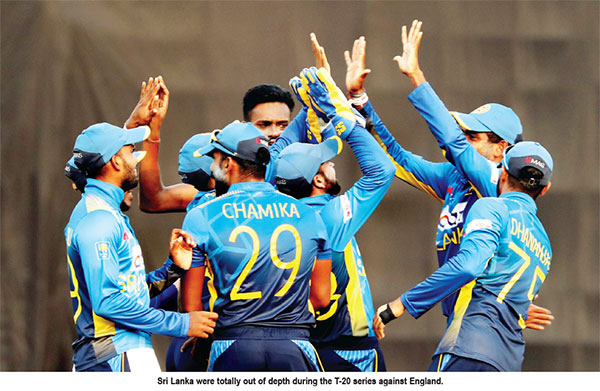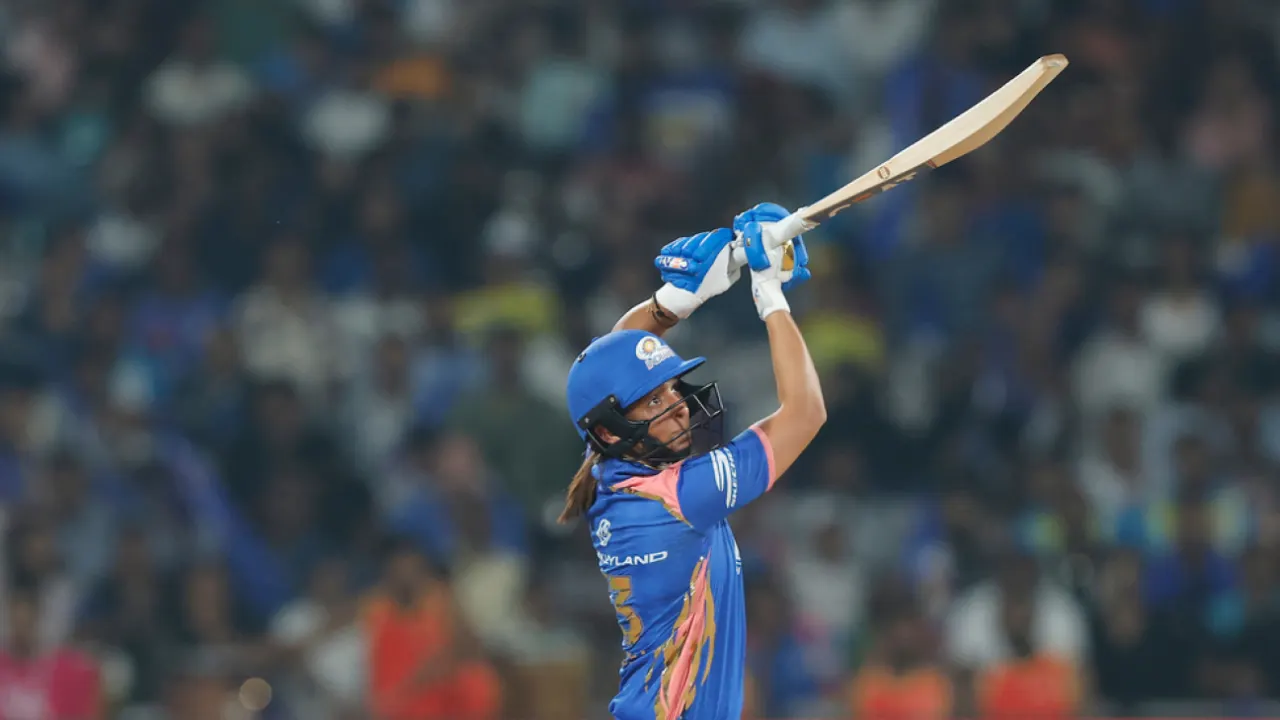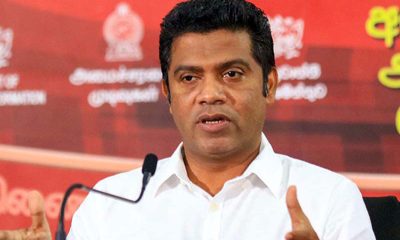Sports
A laughing stock

by Rex Clementine
We were a nation that reinvented how the one-day game was played. Our players were so skilful that they dominated the sport particularly in the white ball formats. Many are the careers that Sanath Jayasuriya ended with his brutal hitting. Many were the games that ended before noon after Chaminda Vaas ran through the top order. Many were the series that Sri Lanka won with a game to spare and then half a dozen seniors were rested for the dead rubber blooding in some promising youngsters. Today, England, the perennial underachievers in limited overs cricket are giving us a taste of our own medicine.
Not even during the nation’s formative years in the sport in 1980s, Sri Lanka suffered such ignominious defeats. Losing is part of the game, but what has been worrying is the manner in which Sri Lanka lost, unable to find the boundary in the Power Plays and unable to bat out the full quota of 20 overs. Surely, a school team would show more character and courage than this.
To make matters worse, the players are adamant that they will not sign central contracts. Four of them who were supposed to attend a residential training camp in Dambulla ahead of the India series were sent home on Saturday for their stubbornness.
England are the defending champions in the 50 over game and world’s number one ranked team in the 20 over format, not many fans expected Kusal Perera’s side return victorious when they went to UK. But at least, it was expected the team will put up a fight. The batting display they put up throughout the series was shocking to say the least. In England, you expect a team to improve on their batting performances as they spend more time on tour. Sri Lankan batting went on the reverse faring worse every game.
Batting has been a concern for some time now no doubt. There have been various excuses given over the last six months but it is tough to imagine how Grant Flower, the Batting Coach, will survive this debacle. When put under pressure, the options that the batsmen took were simply no good.
What’s more shocking is that coaches like Mickey Arthur and Tom Moody, who have been in the business for long enough now have failed to address tactical issues. The buck, however, should not stop with Flower, Arthur or Moody. We need to take a serious look at things.
Oshada Fernando has been one of our best finds in the last five years. But for god’s sake, he’s a solid Test match player. Why on earth would you expect him to convert his Test match successes in the T-20 format? The excuse that’s going to be given is that Oshada came in only because Avishka Fernando was injured. That’s correct but should you not have enough T-20 cricketers as back up especially now that you are carrying an extended squad.
To add insult to injury, Oshada was coming in when the Power Play was on. Now this is an area that you have been badly exposed earlier in the series and should you be not sending in someone who can clear the boundary? Sri Lanka played a brand of cricket making most of the fielding restrictions two and half decades ago. Today, our players are struggling to find the boundary. For Sanath Jayasuriya, hitting five boundaries in an over was something that he did frequently. Today, our entire team put together is not able to hit six boundaries in 20 overs.
It was clearly evident that Oshada did not belong there. Into the bargain, he’s also an average fielder and a poor runner between the wickets. Another person who doesn’t belong in T-20 format is Dhananjaya de Silva. Surely, we have seen enough of these players to know that in what format they are good at. But how come the decision makers aren’t so sure of these?
When Bhanuka Rajapaksa gets his act together and passes the fitness tests, Sri Lanka will have lesser headaches perhaps. Another guy who has to be seriously looked at for the T-20 format is Sadeera Samarawickrama. His attitude, work ethic and skill set were so good when he toured India and UAE in 2017. But ever since, he has not got a look in.
Here are some of the bigger issues that need to be addressed by all concerned. When the system was given a shake up with as many as six seniors axed from the white ball team, it was a welcome move as change was long overdue. However, the choice of captain was rather perplexing. Now, KJP is one of the nicest guys you will find in cricket. He minds his own business and not a social media warrior which most of our young players are. But he’s also an introvert. You have taken the tough decision of axing all your senior players, but then, how come you give flimsy reasons like that KJP is the only guy who is sure of a place in the side when handing him the captaincy? At one point you are being bold and few minutes later you are extra cautious.
Surely, there’s Dasun Shanaka who dethroned Pakistan as world’s number one ranked team in T-20s not so long ago. Why wasn’t he given the job back? Mysterious indeed. The first thing that KJP does after being appointed captain is to say that he is going to keep wickets. That put Niroshan Dickwella out of the side. Now, we are told that Dickwella was offered a top contract because he features in all three formats. Are these people taking us for a ride?
There are many changes that have happened in cricket and some of them are welcoming moves. But something that authorities are unable to do is changing the domestic structure. The moment we say this, the clubs are on war path. They treat the press like the plague. Provincial or club cricket, our elite domestic tournament can’t have two dozen teams. The rot started there. It was increased to please member clubs in 2016. Since then, our cricket has suffered new lows.
Sports
Kavith top scores as Maris Stella post 270 runs

Under 19 Cricket
Kavith de Silva with a half century (78) and Hashmika Nethshan and Dasun Nethsara with valuable knocks of 40s helped Maris Stell post 270 runs against St. Aloysius’ on day one of the Under 19 cricket encounter at Karandeniya on Tuesday.
For St. Aloysius’ Dulsath Nimviru and Oshada Devinda took four wickets each.
Meanwhile the Under 19 Division I tier B match between Ananda and Isipatana ended in a no decision.
Match Scores
Maris Stella post 270 at Karandeniya
Scores
Maris Stella 270 all out in 79.1 overs (Hansaka Perera 29, Kavith de Silva 78, Hashmika Nethshan 45, Dasun Nethsara 41, Ameesha Fernando 25; Dulsath Nimviru 4/100, Oshada Devinda 4/68)
St. Aloysius’ 54 for 2 in 16 overs
(Gimhan Hansaka 34; Savindu Sathsara 2/15)
No decision at Ananda Mawatha
Scores
Ananda 204 for 9 decl. in 64.2 overs
(Danindu Sellapperuma 21, Himira Kudagama 43, Lithma Perera 28, Binara Umayanga 39, Rashan Dilaksha 29; Tharindu Naveen 2/21, Dasith Senal 3/56)
Isipatana 110 for 5 in 46 overs (Navindu Umeth 48, Dewshan Deneth 23; Himira Kudagama 4/23) (RF)
Latest News
Harmanpreet masterclass seals second-highest chase in WPL, Mumbai Indians go 8-0 against Gujarat Giants

Captain Harmanpreet Kaur’s unbeaten 71 off 43 balls powered Mumbai Indians (MI) to a seven-wicket win over Gujarat Giants [GG], as they chased down 193, the second-highest successful chase in WPL history.
Harmanpreet paced the chase to near perfection, finding support from Amanjot Kaur and Nicola Carey, as MI extended their perfect head-to-head record against Giants to 8-0. MI also maintained their remarkable streak of never losing a WPL match when Harmanpreet scores a fifty, this being the 10th such instance.
Giants began briskly after being put in, with Sophie Devine and Beth Mooney taking on the returning Hayley Matthews for four boundaries in the second over. Devine got an early reprieve, when Shabnim Ismail induced an edge in the opening over and wicketkeeper G Kamalini put down the chance. The miss proved inconsequential as Ismail struck again in the third over, this time having Devine nick behind for 8, with Kamalini holding on.
With Anushka Sharma sidelined through injury, Kanika Ahuja was promoted to No. 3. She ensured the momentum did not dip, getting off the mark with a powerful drive through the covers, and combining with Mooney to inflict damage. After Mooney’s departure, she continued the same alongside Ash Gardner. The pair carried Giants to 99 for 3 at the end of 10th over. Gardner fell in the 10th over and Ahuja followed in the 11th, but Giants had laid a solid platform by then.
MI clawed their way back into the contest after Ahuja’s dismissal. Ayushi Soni, brought in for Anushka, struggled to find fluency, while her partner Georgia Wareham continued to find the gaps regularly. Soni was on 7 off 10 balls at the end of the 16th over when she retired out, becoming the first player in WOL to do so. The move paved the way for Bharti Fulmali, who ensured it paid dividends.
Fulmali survived two lbw appeals in the 17th over from Amanjot, both overturned in her favour. She then launched a late onslaught, taking on Carey with two fours and a six in the 19th, before going even harder in the final over. Fulmali smashed two fours and two sixes off Amanjot as Giants plundered 39 runs across the last two overs, finishing on 192.
Hayley Matthews returned to the top of the order after missing the first two matches with injury. Despite losing her opening partner Kamalini in the third over, she ensured MI made a positive start. However, her stay was short-lived, ending on 22 off 12 balls. That dismissal brought Harmanpreet and Amanjot together, and the pair began to rebuild.
Amanjot soon found her rhythm, unfurling a flurry of boundaries against Wareham and Tanuja Kanwar, while Harmanpreet ticked along at better than run-a-ball through the first 10 overs.
Once set, Amanjot shifted gears, taking on Renuka Singh and Gardner with a series of cleanly struck sixes. The breakthrough for Giants came through Devine, whose slower ball accounted for Amanjot and ended a 72-run partnership.
Harmanpreet, though, remained unfazed and continued to dictate terms, with Carey joining her at a stage when MI required 84 off 48 balls.
Carey swung the momentum decisively in the 16th over, hammering five boundaries off Renuka, who continued to struggle for accuracy. The over slashed the equation to 39 needed off 24 balls.
Harmanpreet soon brought up her half-century off 33 deliveries, and Giants compounded their woes with a series of fielding lapses, putting down three chances of her.
Harmanpreet made them pay, pouncing on the width offered by wayward bowling to keep the chase firmly on track. With four needed off five balls, she sealed the contest by hitting a boundary, through the gap between deep square leg and deep midwicket.
Brief scores:
Mumbai Indians Women 193 for 3 in 19.2 overs (Gunalan Kamalini 13, Hayley Maththews 22, Amanjot Kaur 40, Harmanpreet Kaur 71*, Nicola Carey 38*; Renuka Singh 1-39, Kashvee Gautam 1-33, Sophie Devine 1-29) beat Gujarat Giants Women 192 for 5 in 20 overs (Beth Mooney 33, Kanika Ahuja 35, Ashleigh Gardner 20, Georgia Wareham 43*, Ayushi Sani 11, Bharti Fulmali 36*; Shabnim Ismail 1-25, Hayley Maththews 1-34, Nicola Carey 1-36, Amelia Kerr 1-40 ) by seven wickets
[Cricinfo]
Latest News
Lanka Premier League draft set to take place on March 22

There will be no auction for this year’s Lanka Premier League, Sri Lanka Cricket has announced, with a player draft set to take place instead on March 22.
The sixth edition of the LPL had originally been slated for early December 2025, but was postponed on account of ensuring the readiness of venues for the 2026 World Cup set to be co-hosted by Sri Lanka and India. The league has since been scheduled to take place from July 8 to August 8, which is the SLC’s preferred window.
This will be the first time since 2022 that a draft system is being utilised in the LPL, with both of the past two seasons hosting player auctions.
“During the draft, franchises will select both Sri Lankan and overseas players for the upcoming season of Sri Lanka’s premier domestic T20 tournament,” an SLC media release confirmed.
The inclusion of a sixth team had also been mooted prior to the competition’s postponement, however there have been no developments on that front since. Each of the first five editions of the LPL saw five teams representing Colombo, Galle, Kandy, Dambulla and Jaffna compete.
Earlier this year, Jaffna Kings – formerly the longest-standing franchise, having joined in the tournament’s second edition – and Colombo Strikers were terminated by SLC for “failure to uphold contractual obligations.” As a result, the LPL currently has no franchise owners with a history stretching back beyond 2024. New owners for both the Jaffna and Colombo teams are yet to be announced.
[Cricinfo]
-

 Business3 days ago
Business3 days agoDialog and UnionPay International Join Forces to Elevate Sri Lanka’s Digital Payment Landscape
-

 News3 days ago
News3 days agoSajith: Ashoka Chakra replaces Dharmachakra in Buddhism textbook
-

 Features3 days ago
Features3 days agoThe Paradox of Trump Power: Contested Authoritarian at Home, Uncontested Bully Abroad
-

 Features3 days ago
Features3 days agoSubject:Whatever happened to (my) three million dollars?
-

 News3 days ago
News3 days agoLevel I landslide early warnings issued to the Districts of Badulla, Kandy, Matale and Nuwara-Eliya extended
-

 News3 days ago
News3 days agoNational Communication Programme for Child Health Promotion (SBCC) has been launched. – PM
-

 News3 days ago
News3 days ago65 withdrawn cases re-filed by Govt, PM tells Parliament
-

 Opinion5 days ago
Opinion5 days agoThe minstrel monk and Rafiki, the old mandrill in The Lion King – II



















